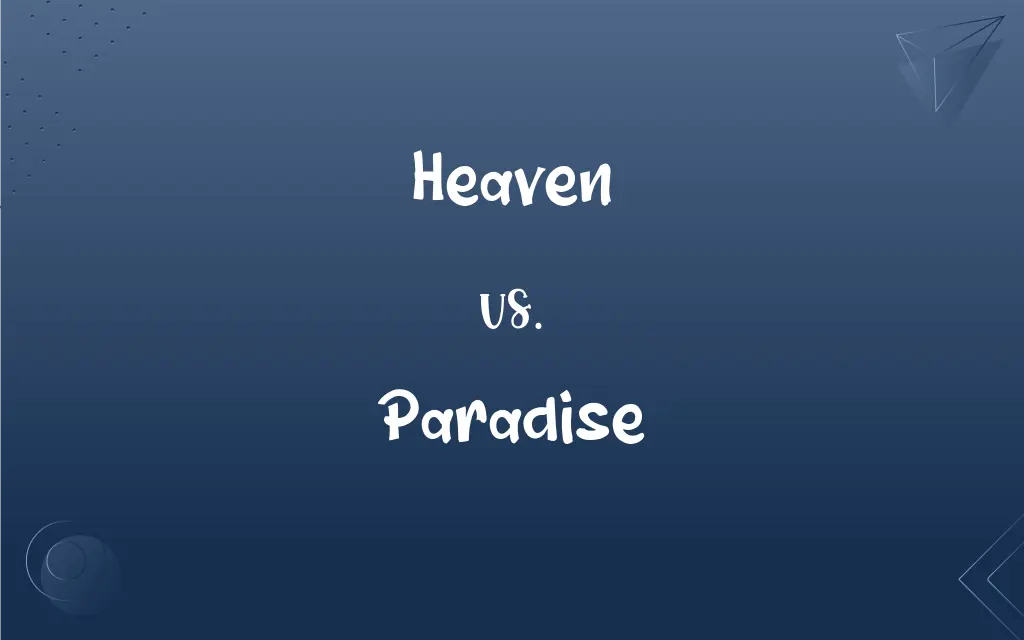Heaven vs. Paradise: What's the Difference?
Edited by Harlon Moss || By Janet White || Published on January 14, 2024
Heaven is often a spiritual realm of the afterlife in various religions, while paradise is a place or condition of ideal happiness.

Key Differences
Heaven is commonly understood in a religious context as a spiritual realm where deities reside or souls go after death. Paradise, while also used in religious texts, often refers more broadly to an ideal place or state of happiness, peace, and fulfillment.
Interpretations of heaven vary widely among different cultures and religions, often seen as a sacred, eternal place. Paradise, historically used in literature and mythology, can refer to both earthly and heavenly utopias.
Heaven is frequently depicted with imagery of celestial beauty, peace, and divine presence. Paradise is often described as a lush, idyllic place, sometimes earthly, embodying perfect contentment and joy.
In language, "heaven" is often used to describe a divine or transcendent state. "Paradise" is regularly employed more secularly, to depict any place or situation of great beauty or happiness.
Heaven typically carries a more specific theological and eschatological connotation, whereas paradise has a more flexible, often secular, and varied usage.
ADVERTISEMENT
Comparison Chart
Definition
A spiritual realm in religious belief
A place or state of bliss, happiness, and peace
Context
Often religious and spiritual
Both religious and secular
Imagery and Symbolism
Celestial, divine presence
Idyllic, often earthly utopia
Usage in Language
Divine, transcendent state
Ideal beauty, happiness, often earthly
Conceptual Meaning
Theological, eschatological significance
Broad, flexible, can be secular or spiritual
ADVERTISEMENT
Heaven and Paradise Definitions
Heaven
Heaven is often seen as where deities reside.
In her prayers, she reached out to the powers of heaven.
Paradise
Paradise often refers to an earthly utopia.
The lush garden was her personal paradise.
Heaven
Heaven is a destination in the afterlife.
His faith promised him an eternal life in heaven.
Paradise
Paradise embodies joy and contentment.
Retiring in the countryside was their idea of paradise.
Heaven
Heaven is symbolic of peace and serenity.
The calmness of the mountains was like heaven on earth.
Paradise
Paradise is a place of ideal happiness.
The tropical island was a paradise for vacationers.
Heaven
Heaven is a spiritual realm in many religions.
They believed good deeds would lead them to heaven.
Paradise
Paradise symbolizes a state of bliss and peace.
Their home felt like paradise, full of love and laughter.
Heaven
Heaven represents a state of ultimate bliss.
For the music enthusiast, the concert was heaven.
Paradise
Paradise is an ideal or perfect place.
For the hikers, the mountain peak was nothing short of paradise.
Heaven
Often heavens The sky or universe as seen from the earth; the firmament.
Paradise
Often Paradise The Garden of Eden.
Heaven
Often Heaven The abode of God, the angels, and the souls of those who are granted salvation.
Paradise
In various religious traditions, the Edenic or heavenly abode of righteous souls after death.
FAQs
Are heaven and paradise interchangeable?
While they can overlap, heaven and paradise have distinct connotations; heaven is more spiritual, paradise often earthly.
Is heaven always religious?
Heaven is primarily used in a religious context, though it can have metaphorical uses.
What is paradise?
Paradise is a place or state of ideal happiness and peace.
Do all religions agree on what heaven is?
Different religions have varied interpretations of heaven.
Can heaven be seen as a state of mind?
In some spiritual interpretations, heaven can be viewed as a state of mind or consciousness.
What is heaven?
Heaven is often a spiritual realm associated with the afterlife in religious beliefs.
Is paradise a physical place?
Paradise can be a physical place or a metaphorical state of happiness.
How do cultures depict heaven?
Various cultures depict heaven in diverse ways, often as a celestial, peaceful realm.
Can people create their own paradise?
Yes, paradise can be a personal creation or interpretation of happiness.
Is heaven considered eternal?
In many beliefs, heaven is considered an eternal, timeless realm.
Can paradise be non-religious?
Yes, paradise is frequently used in both secular and religious contexts.
Are the descriptions of paradise universal?
Descriptions of paradise vary, but often include imagery of beauty and peace.
Can heaven have different meanings in different contexts?
Yes, heaven can have varied meanings depending on religious or metaphorical contexts.
How do children understand heaven?
Children's understanding of heaven is often shaped by cultural and religious teachings.
Is paradise always a place of joy?
Typically, paradise is associated with joy, happiness, and contentment.
How is paradise used in literature?
In literature, paradise is often depicted as an idyllic, perfect place or state.
Do beliefs about paradise change over time?
Yes, beliefs and representations of paradise can evolve with cultural and individual perspectives.
Is paradise a common theme in art?
Yes, paradise is a popular theme in art, symbolizing utopian beauty and bliss.
Do all religions have a concept of paradise?
Many, but not all, religions have concepts similar to paradise.
Is heaven always above?
Traditionally, heaven is often conceptualized as being above or transcendent.
About Author
Written by
Janet WhiteJanet White has been an esteemed writer and blogger for Difference Wiki. Holding a Master's degree in Science and Medical Journalism from the prestigious Boston University, she has consistently demonstrated her expertise and passion for her field. When she's not immersed in her work, Janet relishes her time exercising, delving into a good book, and cherishing moments with friends and family.
Edited by
Harlon MossHarlon is a seasoned quality moderator and accomplished content writer for Difference Wiki. An alumnus of the prestigious University of California, he earned his degree in Computer Science. Leveraging his academic background, Harlon brings a meticulous and informed perspective to his work, ensuring content accuracy and excellence.






































































